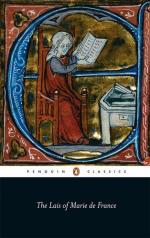|
This section contains 2,000 words (approx. 7 pages at 300 words per page) |

|
Feminism, Anti-feminism and Adultery in the Lais of Marie De France
Summary: Responds to two scholarly articles about the lais of Marie de France. The essay explains portions of Marie's works and seeks to prove that, by creating an unfortunate outcome for all characters who commit adultery, despite their adherence to the code or lack thereof, Marie de France shows her support for strong marital faithfulness rather than revealing her feminist or anti-feminist voice.
In the middle ages knights in every kingdom were expected to follow basic rules set forth by the code of chivalry. According to this code a knight was supposed to show all of the following characteristics; prowess, justice, loyalty, defense, courage, faith, humility, largesse, nobility and franchise. If a man showed these characteristics he was said to be a good "chevalier," a French word for knight (Burgess 1). Marie De France, one of the more well-known female writers of the medieval period, used the term "chevalier" quite often in her Lais when referring to respected male characters. Unfortunately for women, the code of chivalry also meant that women would be held at a lower status than men and traded between the men of the court. In the article "Chivalry and Prowess in the Lais of Marie de France," Glyn Burgess notes that "most of the characters in Marie's Lais...
|
This section contains 2,000 words (approx. 7 pages at 300 words per page) |

|


